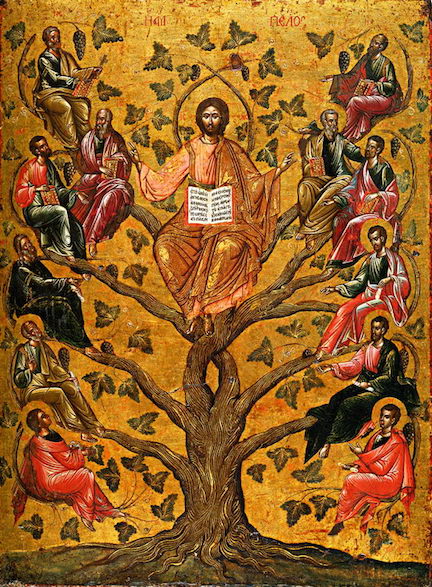In today’s Gospel our Lord speaks of things that resonate deep in the human heart: love, joy, and friendship. We all desire these, so we delight in His words: Remain in my love. . . .I have told you this so that my joy may be in you and your joy might be complete. . . .I have called you friends. . . .
But then He also speaks of something less appealing: commandments: If you keep my commandments, you will remain in my love. . . .This is my commandment: love one another as I love you. . . .You are my friends if you do what I command you.
How do we square these things? On one hand, the appeal of love, joy, and friendship. On the other hand, the burden of commands. Or, put differently: Why is it that we get to love, joy, and friendship only by way of obedience to His commands?
First of all, because in our fallen human nature, we do not understand love, joy, and friendship. Our darkened intellect does not see them clearly and easily accepts counterfeits of them. And our weakened, selfish will distorts them to be what our passions want. We need the teaching of Christ to enlighten our minds and hearts so that we can grasp the true meaning of these blessings. Only in Him, true God and true man, do we see authentic love, real joy, and genuine friendship. Without Him, we have only their natural, wounded versions of those crucial things that incline easily to error and harm.

He not only loved perfectly in this world but is Himself Love Incarnate. Unless, then, His perfect love is the standard, our love risks becoming mere sentimentality – silly at best, brutal at worst. Unhinged from Truth, our loves tend towards the tenderness that causes so much wreckage in our families and society. And that, in Flannery O’Connor’s famous words, “leads to the gas chamber.”
He lived a genuinely joyful life, in complete abandonment to the Father and in the midst of the worst sufferings. Without this example, we will seek complacency, fun, or physical pleasure instead of joy.
Finally, He showed Himself the perfect friend, loving his own in the world and loving them to the end. (cf. Jn 13:1) Without His example to teach us, we will likely settle for superficial relationships masquerading as friendships. These may produce the banality of drinking buddies or the brutality of cliques and gangs.
But it is not only His words and example that bring us the reality of the greatest of gifts. In fact, our Lord’s teaching – and even His salutary example – can become what seems an external, frustrating imposition upon us. We cannot hope to imitate His example or live His commands by our own power. It is only by way of that transforming union with Him that we have the ability to attain and imitate His love, joy, and friendship. Unless He comes to our assistance, His commands become torturous.
So we have to hear our Lord’s commands within their context, specifically in light of His preceding words about the vine and branches (last Sunday’s Gospel): Remain in me, as I remain in you. . . .I am the vine, you are the branches. He speaks about our union with Him before He speaks about our obedience to Him. Union precedes obedience and makes it possible.
The sap of the vine flows into the branches. His love, joy, and friendship are, in effect, already within us from our being grafted onto the Vine. So His commands arise not from outside but from within us. They help us to become what we truly are. They are no more foreign to us than the vine’s sap is to the branches. To obey His commands simply means to remain on the vine and be true to what He has made us.
Our Lord can command what He does because he has already given us the grace to respond. So Saint Augustine could pray Da quod iubes et iube quod vis (“Give what you command and command what you will”), fully confident that God had, in effect, already given the grace to live His commands.
The broader context of our Lord’s words is the Last Supper, when He established the Sacrament of love, joy, and friendship. So it is most of all by the frequent and devout reception of Holy Communion that we remain in Him and He in us. It is by that union with Him – that remaining on the Vine – that we branches receive the grace to love, to rejoice, and to be friends as He commands.
*Image: Christ the True Vine, Eastern Orthodox icon, 16thcentury [Byzantine and Christian Museum, Athens]














